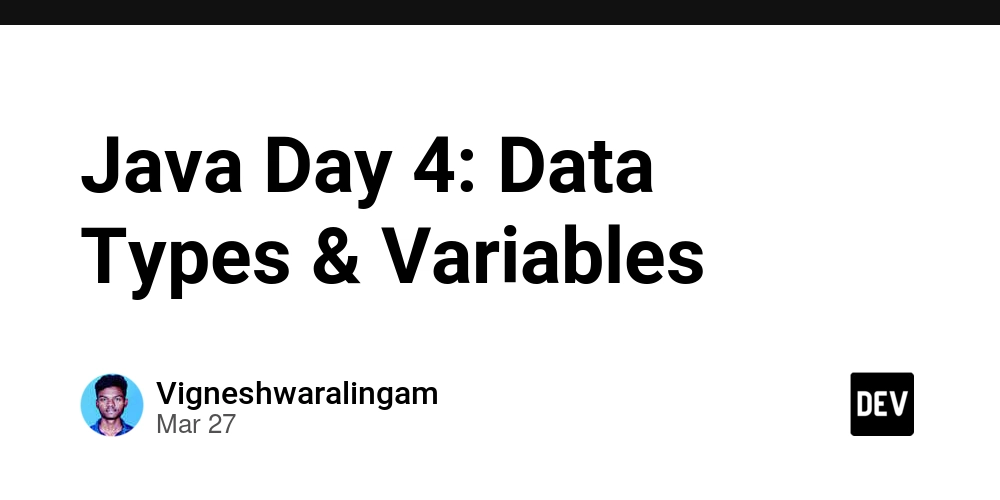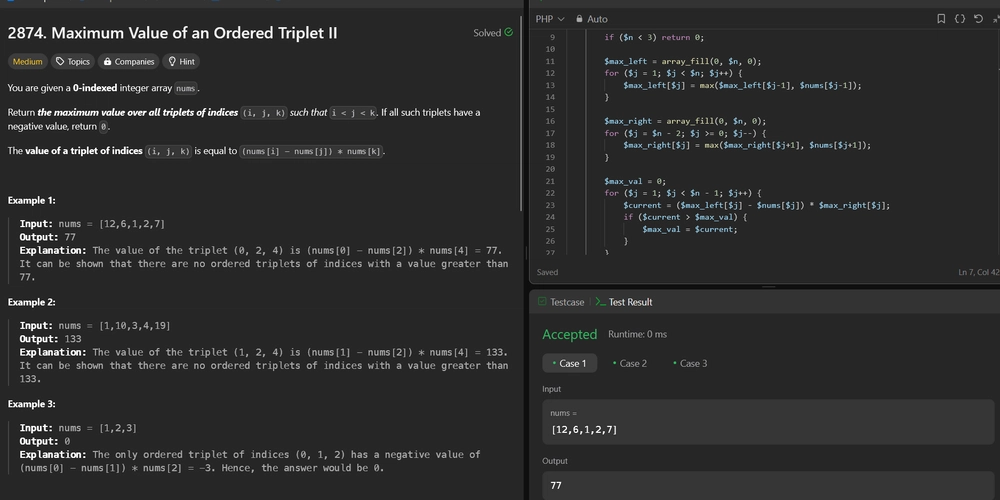Java Day 4: Data Types & Variables
Java Day 4: Data Types & Variables In Java, data types define the kind of values a variable can store. Java has two main categories: 1️⃣ Primitive Data Types 2️⃣ Non-Primitive Data Types 1. Primitive Data Types These are built-in data types that store simple values. There are 8 primitive types in Java: Whole Numbers (Integer Types) Data Type Size Range byte 1 byte -128 to 127 short 2 bytes -32,768 to 32,767 int 4 bytes -2³¹ to 2³¹-1 long 8 bytes -2⁶³ to 2⁶³-1 Decimal Numbers (Floating-Point Types) Data Type Size Precision float 4 bytes 6–7 decimal places double 8 bytes 15 decimal places Other Primitive Types Data Type Size Stores char 2 bytes Single character (Unicode) boolean 1 bit true or false Example: byte b = 127; short s = 3000; int i = 100000; long l = 1000000000L; float f = 10.5f; double d = 99.99; char c = 'A'; boolean isJavaFun = true; 2. Non-Primitive Data Types (Reference Types) These store references to objects, not actual values. Examples: String, Arrays, Classes, Interfaces Can be null (primitive types cannot). Example: String name = "Vignesh"; int[] numbers = {1, 2, 3, 4, 5}; Why are they called "Primitive" and "Non-Primitive"? Primitive types store actual values in memory. Non-primitive types store a reference (address) to the value. 3. Variable Declaration, Initialization, and Assignment Declaration: Only declaring a variable (no value assigned). int age; Initialization: Assigning a value when declaring. int age = 21; Assignment: Changing the value later. age = 25; 4. Global vs Local Variables Global Variables (Declared outside methods, available globally) ✅ Use static keyword to access without an object. public class Home { static String name = "Vignesh"; static int age = 21; } Access them using ClassName.variableName: System.out.println(Home.name); // Vignesh System.out.println(Home.age); // 21 Local Variables (Declared inside methods, only available within that method)

Java Day 4: Data Types & Variables
In Java, data types define the kind of values a variable can store. Java has two main categories:
1️⃣ Primitive Data Types
2️⃣ Non-Primitive Data Types
1. Primitive Data Types
These are built-in data types that store simple values. There are 8 primitive types in Java:
Whole Numbers (Integer Types)
| Data Type | Size | Range |
|---|---|---|
| byte | 1 byte | -128 to 127 |
| short | 2 bytes | -32,768 to 32,767 |
| int | 4 bytes | -2³¹ to 2³¹-1 |
| long | 8 bytes | -2⁶³ to 2⁶³-1 |
Decimal Numbers (Floating-Point Types)
| Data Type | Size | Precision |
|---|---|---|
| float | 4 bytes | 6–7 decimal places |
| double | 8 bytes | 15 decimal places |
Other Primitive Types
| Data Type | Size | Stores |
|---|---|---|
| char | 2 bytes | Single character (Unicode) |
| boolean | 1 bit | true or false |
Example:
byte b = 127;
short s = 3000;
int i = 100000;
long l = 1000000000L;
float f = 10.5f;
double d = 99.99;
char c = 'A';
boolean isJavaFun = true;
2. Non-Primitive Data Types (Reference Types)
- These store references to objects, not actual values.
- Examples: String, Arrays, Classes, Interfaces
- Can be null (primitive types cannot).
Example:
String name = "Vignesh";
int[] numbers = {1, 2, 3, 4, 5};
Why are they called "Primitive" and "Non-Primitive"?
- Primitive types store actual values in memory.
- Non-primitive types store a reference (address) to the value.
3. Variable Declaration, Initialization, and Assignment
Declaration: Only declaring a variable (no value assigned).
int age;
Initialization: Assigning a value when declaring.
int age = 21;
Assignment: Changing the value later.
age = 25;
4. Global vs Local Variables
Global Variables (Declared outside methods, available globally)
✅ Use static keyword to access without an object.
public class Home {
static String name = "Vignesh";
static int age = 21;
}
Access them using ClassName.variableName:
System.out.println(Home.name); // Vignesh
System.out.println(Home.age); // 21
Local Variables (Declared inside methods, only available within that method)














































































